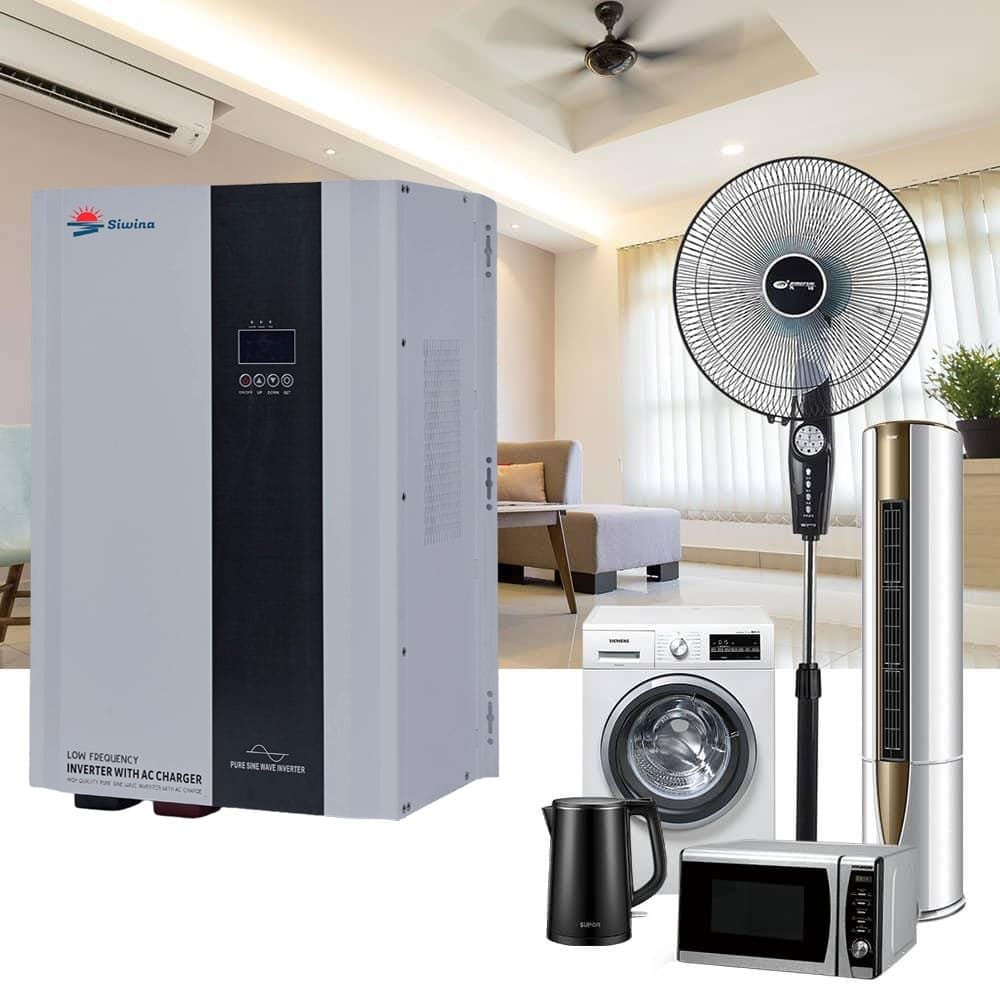Low-Frequency Inverters: The Best Choice for Heavy-Duty Applications
When it comes to powering heavy-duty applications such as water pumps, industrial motors, and refrigeration systems in off-grid solar setups, choosing the right inverter is crucial. Low-frequency inverters are often considered the best choice for these demanding applications, thanks to their robust design, superior performance, and enhanced durability. In this article, we’ll explore why low-frequency inverters excel in heavy-duty applications and why importers should prioritize them when selecting inverters for high-load systems.
1. What is a Low-Frequency Inverter?
Low-frequency inverters operate at a lower switching frequency (typically 50 Hz to 60 Hz) compared to high-frequency inverters. This design results in a more durable and reliable product, especially suitable for applications that require continuous and stable power output. These inverters use a heavy transformer, which allows them to handle higher surge and continuous power loads without compromising performance.
2. Why Choose Low-Frequency Inverters for Heavy-Duty Applications?
a) Superior Surge Capacity for High Power Loads
Heavy-duty applications often involve equipment with high surge demands, such as:
Water pumps: Especially those used for irrigation and other agricultural applications.
Motors: High-power motors, including those used in industrial machinery and refrigeration.
Air conditioners: Systems that require a substantial surge at startup.
Low-frequency inverters are designed to handle these large surge capacities with ease, making them ideal for such power-hungry applications. Their ability to manage large inrush currents ensures that sensitive equipment is powered without damage or malfunction.
b) Enhanced Durability and Long-Term Reliability
One of the key features of low-frequency inverters is their rugged construction. These inverters are equipped with a transformer, which increases their overall durability compared to high-frequency inverters. The transformer helps absorb electrical surges and provides stable operation over extended periods.
Industrial-grade components: Low-frequency inverters are often made with industrial-grade components, which improves their performance in harsh environments.
Longer lifespan: Due to their sturdy design, these inverters typically last much longer than high-frequency alternatives, which is crucial for long-term heavy-duty applications.
c) Excellent Performance with Inductive Loads
Inductive loads, such as motors and transformers, are common in heavy-duty applications. Low-frequency inverters are specifically designed to handle inductive loads without sacrificing efficiency. High-frequency inverters, on the other hand, may struggle to provide stable power to such loads, leading to efficiency losses and even damage to connected devices.
Low-frequency inverters ensure consistent voltage and frequency output, which helps prevent overheating and wear-and-tear on connected equipment.
d) Better Overload Handling
Low-frequency inverters are typically designed to handle overload conditions better than high-frequency inverters. This is particularly important in environments where equipment is required to run at high capacities for extended periods, such as industrial operations or off-grid agricultural systems.
Continuous power output: Low-frequency inverters provide continuous power even under heavy loads.
Overload protection: Built-in overload protection mechanisms prevent the inverter from shutting down under excessive loads, ensuring stable and uninterrupted operation.
3. The Key Benefits of Low-Frequency Inverters for Heavy-Duty Applications
a) Stable Output and Reduced Noise
Low-frequency inverters are known for producing stable sine-wave outputs, which are crucial for sensitive equipment like industrial motors and pumps. Their lower switching frequency reduces the electromagnetic noise generated by the inverter, which is often a concern for sensitive applications. This stability ensures that equipment performs efficiently, without unnecessary wear due to voltage fluctuations or interference.
b) Support for Large Battery Banks
Heavy-duty applications often require large battery banks for storage, and low-frequency inverters are well-suited to manage these large energy storage systems. These inverters can handle the larger current demands of large battery banks, ensuring fast and efficient charging and discharging cycles.
c) Easy Maintenance and Serviceability
Low-frequency inverters are typically easier to maintain due to their simple design. The robust transformer-based technology reduces the likelihood of component failure, and in the event that repairs are needed, the availability of spare parts and technical support is more common. This makes low-frequency inverters a practical choice for long-term operations, especially in remote areas where quick servicing may not be possible.
4. Where Are Low-Frequency Inverters Most Commonly Used?
Low-frequency inverters are widely used in the following applications:
Agricultural systems: Powering irrigation pumps, water wells, and large-scale farming equipment.
Industrial operations: Providing reliable power to motors, compressors, and other heavy machinery.
Refrigeration: Ensuring smooth operation of refrigeration units in off-grid locations, such as remote hotels and clinics.
Residential applications: Running high-power home appliances like air conditioners, water heaters, and electric stoves in off-grid homes.
5. Conclusion: Why Importers Should Choose Low-Frequency Inverters for Heavy-Duty Applications
For importers and distributors dealing with off-grid solar systems, low-frequency inverters are an excellent investment for heavy-duty applications. Their ability to handle high surge capacities, provide stable output, and offer long-term durability makes them a superior choice for systems requiring reliable and continuous power.
The following benefits make low-frequency inverters a smart choice for importers and customers alike:
Superior surge capacity for heavy-duty equipment
Increased durability and longer lifespan
Consistent power supply to sensitive and inductive loads
Easy maintenance and serviceability
Wide range of applications in agriculture, industry, and residential use
When selecting inverters for your customers, especially in heavy-duty applications, low-frequency inverters are the best option to ensure efficiency, reliability, and performance.
Ready to learn more about low-frequency inverters? Contact us today to discuss the best inverter solutions for your heavy-duty off-grid solar projects.

